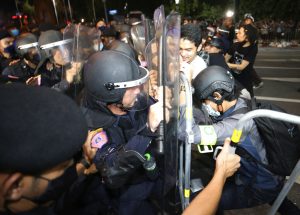After watching on impassively at the country’s gathering wave of public protests, the Thai government has declared a severe state of emergency and forcibly cleared hundreds of protesters from outside the prime minister’s office in Bangkok.
The emergency decree, which took effect at 4am local-time, bans gatherings of five or more people and allows authorities to stop people from entering any area they designate.
“It is very important to have urgent measures to fix this and halt this conduct effectively so the law is respected and the public is in order,” stated the emergency decree, which was described as “severe” in order to distinguish it from the garden variety state of emergency that was has been in place for months due to COVID-19.
The order also bars the “publication of news, other media, and electronic information that contains messages that could create fear or intentionally distort information, creating misunderstanding that will affect national security or peace and order.”
The decree comes after the third major street protest by student activists who are calling for the resignation of Prime Minister Prayut Chan-o-cha, a former junta leader, and the formulation of a new constitution. Protest leaders have also cracked a longstanding taboo by calling for reforms to Thailand’s monarchy, and evinced a growing anger at the spendthrift, jet-setting lifestyle of King Maha Vajiralongkorn, who spends most of his time in Germany.
In the late afternoon, at the height of the October 14 protest, police were forced to hold back anti-government protesters to allow the passage of a royal motorcade, as it moved from Dusit Palace to the Grand Palace for a religious function. As the motorcade inched past, protesters flashed a defiant three-finger salute – drawn from the Hunger Games film franchise – and reportedly chanted “my god damn tax” at the passing vehicle.
The obstruction of the royal motorcade was cited by the government as one reason for the imposition of further emergency measures. While it was unclear whether King Vajiralongkorn was inside the vehicle, it was a remarkable scene in a country where the monarchy has been granted an exalted status, and protected by a lese-majeste law that punishes criticism of the royal family with prison terms of up to 15 years.
Protest leaders said they planned to rally outside Government House for at least three days in their bid to force Prayut to resign. But shortly after the emergency decree took effect, riot police advanced on a few hundred protesters who had camped out in front of Prayut’s office. By dawn, they had been displaced by riot police, while city workers were brought in to clean up the streets. One reason for the rapid clearing of the area in front of Government House is the fact that China’s Foreign Minister Wang Yi is set to meet there with Prayut today, on the final stop of a five-nation tour of Southeast Asia.
Several protest leaders, including human rights lawyer Arnon Nampa and student activist Parit “Penguin” Chiwarak were also detained by authorities prior to the dispersal of the anti-government gathering. Under the terms of the new state of emergency, they can be held for up to 30 days. Many activists have vowed to ignore the current restrictions, planning additional rallies to protest the arrests.
Where will things go from here? The latest move only affirms what I wrote in these pages earlier this week, that the Thai government has shown little inclination of compromising with student leaders. It has now equipped itself with the tools to clamp down on any resurgence of protest activity in the weeks and months to come. In the hours after the announcement of the emergency decree, soldiers were sighted at Government House and parliament, raising the specter of another military takeover in a nation that has seen many.
But as with the cycle of protest and repression that has recurred in Thailand for decades, pushing demonstrators and dissenters out of sight – either by the threat or use of violence – will do little to address the anger that simmers beneath the present calls for change. That activists are willing to take the risk of assailing the institution of the Thai monarchy is an indication of how deep the discontent runs – anger that is only likely to build as the country slides further into economic recession due to COVID-19.
The authorities’ staunch defense of an unequal status quo, and students’ increasingly bold demands for a restructuring of power relations in Thailand, have set the two camps on a collision course.

































